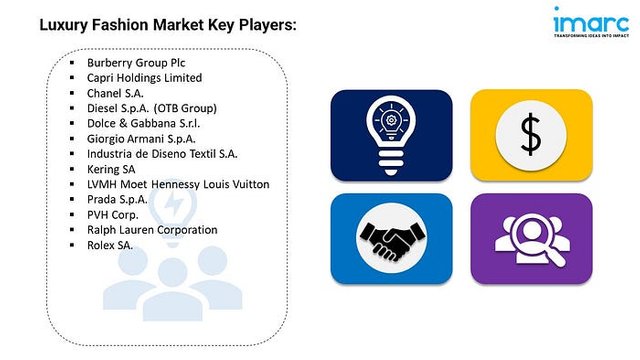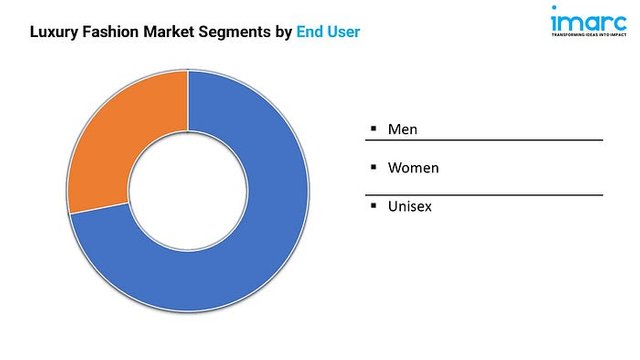Market Overview:
The luxury fashion market is experiencing rapid growth, driven by digital & experiential retail, sustainability & ethical values, and personalization & exclusivity. According to IMARC Group's latest research publication, "Luxury Fashion Market Report by Product Type (Clothing & Apparel, Footwear, Accessories), Distribution Channel (Store-Based, Non-Store Based), End User (Men, Women, Unisex), and Region 2025-2033", The global luxury fashion market size reached USD 253.3 Billion in 2024. Looking forward, IMARC Group expects the market to reach USD 334.6 Billion by 2033, exhibiting a growth rate (CAGR) of 3.05% during 2025-2033.
This detailed analysis primarily encompasses industry size, business trends, market share, key growth factors, and regional forecasts. The report offers a comprehensive overview and integrates research findings, market assessments, and data from different sources. It also includes pivotal market dynamics like drivers and challenges, while also highlighting growth opportunities, financial insights, technological improvements, emerging trends, and innovations. Besides this, the report provides regional market evaluation, along with a competitive landscape analysis.
Grab a sample PDF of this report: https://www.imarcgroup.com/luxury-fashion-market/requestsample
Our report includes:
- Market Dynamics
- Market Trends And Market Outlook
- Competitive Analysis
- Industry Segmentation
- Strategic Recommendations
Factors Affecting the Growth of the Luxury Fashion Industry:
- Digital & Experiential Retail:
Luxury fashion market is undergoing a significant change in digital and experienced retail convergence. Brands quickly utilize e-commerce platforms, social media and immersive techniques to contact consumers and increase the online shopping experience. Virtual Tri -on, Enhanced Reality (AR) experience and individual digital styling become commonplace, so that customers can interact with products in new and innovative ways. In addition, the emergence of live streaming and influence creates marketing new ways for brands to demonstrate the collection and contact extensive target groups. In addition, physical retail space develops in experienced destinations, offering personal services, exclusive events and immersive brand experiences. Flagship stores will be exhibition windows for brand narrative and artistic collaboration, which blend the lines between retail and entertainment. Interactive screens and individual buying assistants such as integrating technology into physical stores as assistants further enhance the customer experience. This dynamic interaction between digital and experienced retail is to redefine luxurious shopping experience, promote commitment and brand loyalty.
- Sustainability & Ethical Values:
Stability and moral values in luxurious fashion markets are becoming increasingly important drivers. Consumers, especially the younger generation, require openness and responsibility from the brand of the environment and social impact. This includes durable materials, moral work practices and use of responsible purchasing. Marks respond by investing in circular financial initiatives, such as apology, recycling and resale programs. In addition, decisions of certificates and standards, such as organic textiles and fair labor, are given traction. Crafts on crafts and long life are also in accordance with the principles of stability, as consumers seek high quality products designed for earlier. Marks also communicate their stability efforts through storytelling and educational campaigns, building faith and enthusiastically related to conscious consumers. The ability to show a real commitment to stability and moral values becomes an important factor in maintaining brand relevance and attracting sensible customers.
- Personalization & Exclusivity:
Luxury fashion markets provide increasing emphasis on personalization and specificity, as consumers are seeking unique and dizzle experiences. Marks provide special access to custom products, individual styling services and limited cultural collections. The emergence of with-to-maps and bishop's services is affected and serves individual fashion. In addition, the use of data analysis and AI enables brands to adapt marketing and customer interactions, making goal campaign and personal product recommendations. The construction of exclusive communities and membership programs also increases the unique and spirit of the associated. Brands utilize individual experiences such as virtual styling sessions and customized product recommendations to offer digital platforms. Crafts improve the unique with luxury products that focus on crafts and artistry, to create unique and limited-Steriti pieces to collaborate with artisans and designers with brands. This driving force for privatization and uniqueness forms the luxurious fashion market, and meets the developed preferences of sensible consumers that affect personality and unique experiences.
Leading Companies Operating in the Global Luxury Fashion Industry:

- Burberry Group Plc
- Capri Holdings Limited
- Chanel S.A.
- Diesel S.p.A. (OTB Group)
- Dolce & Gabbana S.r.l.
- Giorgio Armani S.p.A.
- Industria de Diseno Textil S.A.
- Kering SA
- LVMH Moet Hennessy Louis Vuitton
- Prada S.p.A.
- PVH Corp.
- Ralph Lauren Corporation
- Rolex SA.
Luxury Fashion Market Report Segmentation:
Breakup By Product Type:
- Clothing & Apparel
- Jackets & Coats
- Skirts
- Shirts & T-Shirts
- Dresses
- Trousers & Shorts
- Denim
- Underwear & Lingerie
- Others
- Footwear
- Accessories
- Gems & Jewellery
- Belts
- Bags
- Watches
Clothing & apparel (jackets & coats, skirts, shirts & T-shirts, dresses, trousers & shorts, denim, underwear & lingerie, and others) exhibit a clear dominance in the market owing to high demand for premium and designer wear in both casual and formal segments.
Breakup By Distribution Channel:
- Store-Based
- Non-Store Based
Store-based represents the largest segment due to the buyer preference for in-store experience for personalized service and exclusivity.
Breakup By End User:
- Men
- Women
- Unisex
Women account for the majority of the market share, as they are the primary user of luxury fashion products.
Breakup By Region:
- North America (United States, Canada)
- Asia Pacific (China, Japan, India, South Korea, Australia, Indonesia, Others)
- Europe (Germany, France, United Kingdom, Italy, Spain, Russia, Others)
- Latin America (Brazil, Mexico, Others)
- Middle East and Africa
Europe dominates the market, driven by its rich heritage of luxury fashion houses and affluent user base.
Research Methodology:
The report employs a comprehensive research methodology, combining primary and secondary data sources to validate findings. It includes market assessments, surveys, expert opinions, and data triangulation techniques to ensure accuracy and reliability.
Note: If you require specific details, data, or insights that are not currently included in the scope of this report, we are happy to accommodate your request. As part of our customization service, we will gather and provide the additional information you need, tailored to your specific requirements. Please let us know your exact needs, and we will ensure the report is updated accordingly to meet your expectations.
About Us:
IMARC Group is a global management consulting firm that helps the world’s most ambitious changemakers to create a lasting impact. The company provide a comprehensive suite of market entry and expansion services. IMARC offerings include thorough market assessment, feasibility studies, company incorporation assistance, factory setup support, regulatory approvals and licensing navigation, branding, marketing and sales strategies, competitive landscape and benchmarking analyses, pricing and cost research, and procurement research.
Contact Us:
IMARC Group
134 N 4th St. Brooklyn, NY 11249, USA
Email: [email protected]
Tel No:(D) +91 120 433 0800
United States: +1-631-791-1145
